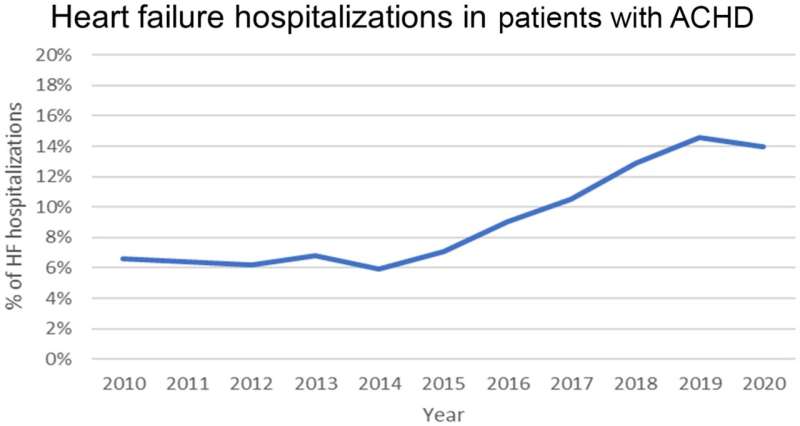This article has been reviewed according to Science X's editorial process and policies. Editors have highlighted the following attributes while ensuring the content's credibility:
fact-checked
peer-reviewed publication
trusted source
proofread
How can adults with congenital heart disease reduce risks? Study finds lifetime cardiology monitoring is key

Heart failure is a potentially urgent health concern for young adults with congenital heart disease (ACHD) that is often overlooked and undertreated, even as hospitalizations for this condition continue to rise.
New research from Mayo Clinic shows that young adults in the U.S. living with congenital heart disease are at an increased risk of death or cardiovascular complications after being hospitalized for heart failure. However, study data published in the Journal of the American Heart Association also found that patients who had been receiving recent cardiology care before a heart failure hospitalization were less likely to die.
"More than 85% of children born with congenital heart disease reach adulthood. They are likely to experience complications later, yet 61% of these patients beyond the age of 18 do not see a cardiology specialist," says Luke Burchill, M.B.B.S., Ph.D., a cardiologist at Mayo Clinic and first author of the study. "These young adult patients have a strong need for individualized care pathways to improve their quality of life and monitor health issues like heart failure."
Prior research showed that heart failure hospitalizations of U.S. adults with congenital heart disease increased dramatically from 1998 to 2011. To further understand this trend and its effect on patients and hospital resources, Dr. Burchill and colleagues used national data to study a retrospective cohort of adults with congenital heart disease hospitalized in the past decade. The percentage of ACHD heart failure hospitalizations increased significantly, rising from 6.6% in 2010 to 14% in 2020.
In more than 26,000 unique hospital admissions of ACHD patients, 22% had heart failure, and 78% did not. Those admitted with heart failure had a higher risk of death and other major heart and brain complications and used more health care resources, including rehospitalization and post-acute care services, than those admitted without heart failure. However, people who had a cardiology clinic visit within 30 days prior to hospital admission had lower death rates due to any causes at the 90-day and 1-year mark.
The ACHD patients with heart failure were nearly twice as likely as those without heart failure to be readmitted to a hospital, especially those under age 45, regardless of their type of congenital heart disease. Younger patients also required more medical or supportive care after they left the hospital before they could return home and care for themselves.
"Many of the patients I meet with ACHD and heart failure share a similar story of not having their heart-related symptoms taken seriously, leading to a delayed recognition and treatment of heart failure. The good news is that we can reset the course for most," says Dr. Burchill.
"We have new medications to restrengthen the heart, new options for replacing heart valves without opening the chest, and low-risk treatments for returning heart rhythm to normal. We aim to shift the focus from heart failure to heart function and patient success in feeling better and living longer."
More information: Pradyumna Agasthi et al, Mortality and Morbidity of Heart Failure Hospitalization in Adult Patients With Congenital Heart Disease, Journal of the American Heart Association (2023). DOI: 10.1161/JAHA.123.030649




















